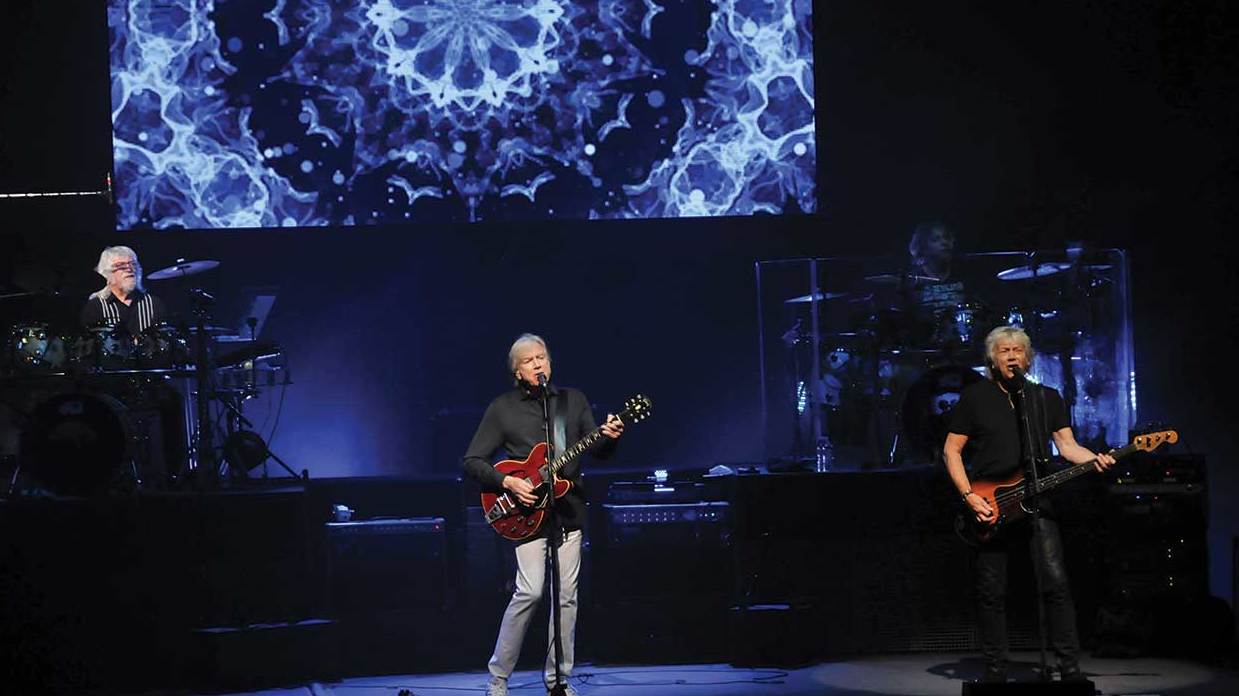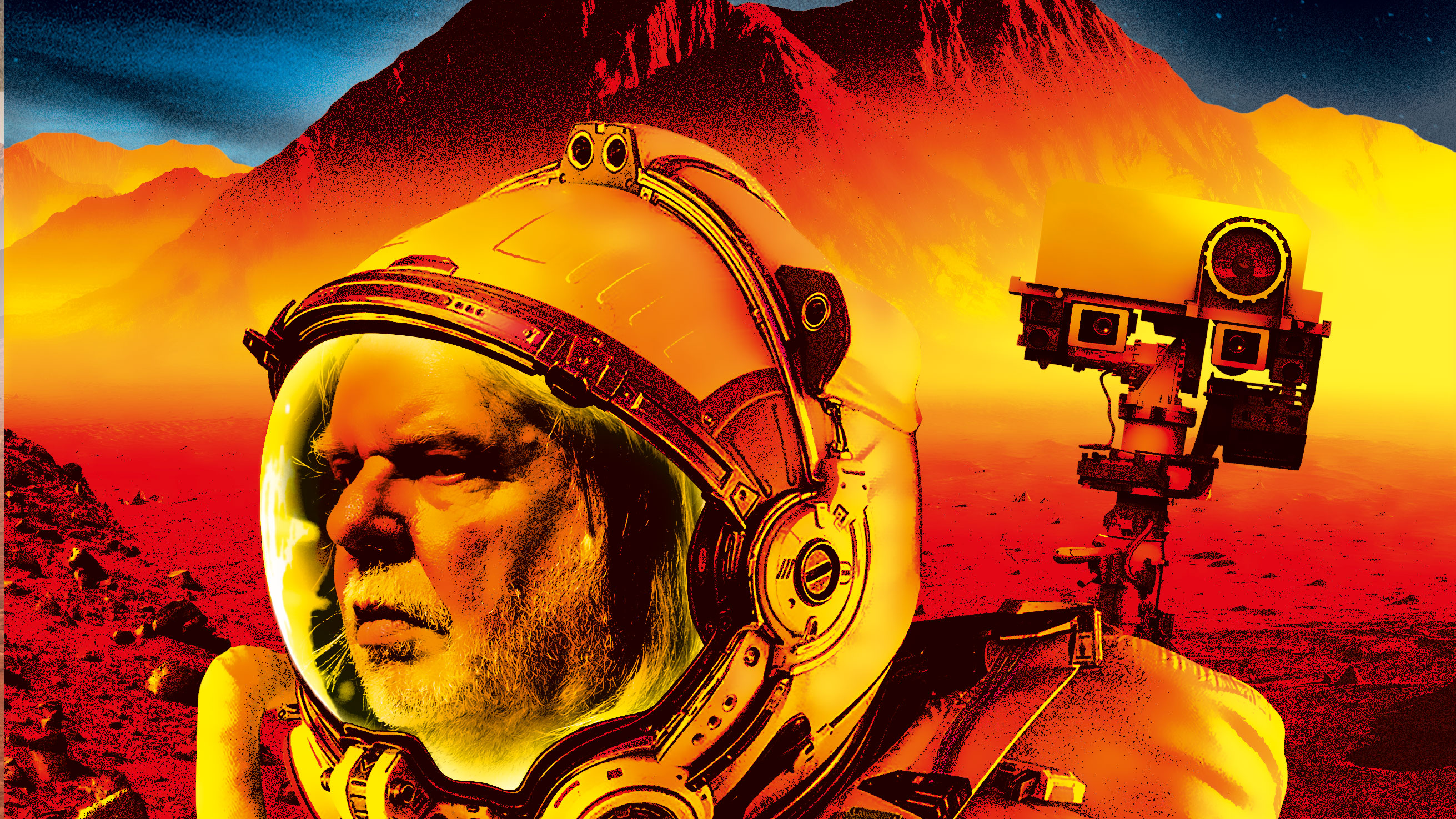You can trust Louder
It’s amusing that less than an hour away in Hartford tonight, just 30 miles right up I-91, kids are having their first taste of abandon at the Warped Tour, while their grandparents are here reliving the very same thing: tailgating, and maybe enjoying a warm up toke or two in the parking lot before the show.
It’s 50 years since the Summer Of Love, which changed their lives, and it’s just as many years since Days Of Future Passed also changed the fortunes of The Moody Blues. Fitting, then, that this 28-date tour feels like a celebration of who the audience were, as much as what the Moodies became. There’s a bit of tribe-like ambience throughout the venue leading up to show time that harks back to that album changing not only the way the fans here heard music, but maybe their optimism in a chaotic world as well.
So it’s curious that commemorating what has become regarded as a pioneering prog LP should start with a set of greatest hits that came in the wake of that album’s success. No matter, as the band bound through I’m Just A Singer (In A Rock And Roll Band) with a vigour that brings people to their feet.
This tour feels like a celebration of who the audience were, as much as what the Moodies became.
That opening number and The Story In Your Eyes show that guitarist Justin Hayward is still capable of pulling off smart, concise leads, while I Know You’re Out There Somewhere showcases the combined strength of him and bassist John Lodge singing together.
Hayward, Lodge and drummer Graeme Edge may be the charter members here, but their younger recruits – Billy Ashbaugh, Julie Ragins, Alan Hewitt and Norda Mullen – are all skillful players who earn rounds of applause for livening up the delicate nuances of many of the songs and making them more robust. In particular, Mullen’s flute and acoustic guitar give an airy lift in all the familiar places, without pandering to any sort of faded hippie nostalgia. Her enthusiasm as a performer also balances Lodge hopping about at stage left.
Edge, now something of a constitutional monarch, is keeping time and adding percussion while Ashbaugh shoulders the main weight of the drumming load. It’s another agreeable tandem, making for a fully rounded blend of power and finesse that’s also visually striking. An onstage malfunction breaks the pace somewhat, but Lodge buys time by fumbling through an awkward, if not charming, explanation of IT technology gone awry. It’s rather entertaining, and not nearly so halting as the format of the second set.
Sign up below to get the latest from Prog, plus exclusive special offers, direct to your inbox!
The intermission sets up Days Of Future Passed in full, coming alive with gorgeous footage and actor Jeremy Irons onscreen in the roll of narrator for The Day Begins. The video throughout this second set is truly breathtaking. Together with the magnificent score that sounds colossal through the PA, the whole thing looks and sounds – feels, really – like some sort of fabulous, panoramic motion picture. And therein lies the problem.
The stop-start action of pre-recorded orchestral interludes leaves silhouetted band members standing around, waiting to resume, making too many long minutes seem more like watching a movie rather than a live concert. It’s a bit like the infamous Andy Kaufman phonograph sketch on Saturday Night Live, giving the whole thing a disrupted feel that drags against the momentum of the actual performance – not that the audience care. Days Of Future Passed finally coming fully to life, regardless of how it’s done, has them captivated and responding with enthusiastic approval.
The band do sound impressive whenever they’re playing non-orchestra sections, such as the well-known hits Tuesday Afternoon and Nights In White Satin. The encore of Question and Ride My See-Saw keeps the crowd standing, proof that the Moodies are on point as a live act. However, the uneven pairing of performance and recording puts too much of a dampener on the Days Of Future Passed set nearly every time the band start to cook.
Granted, the logistics and finances of travelling with an orchestra, or even coordinating a local symphony in every city, are better left undone. The same is probably true to changing arrangements and re-calibrating the orchestral sections to accommodate a more minimal rock’n’roll band format. Still, two shows with a full orchestra filmed for a DVD just days before in Toronto must have been a celebration with much more impact.
The irony of the fanfare about The Moody Blues performing an iconic album in its entirety for the very first time is that the major aspect that made it so beloved in the first place is now a burdensome anchor.

